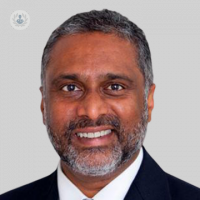Series (Part Three): Living with GORD
Written by:Consultant physician and gastroenterology specialist, Dr Andrew Thillainayagam and Dr Neil Galletly, clinical research fellow, consider the impact of gastro-oesophageal reflux disease (GORD) diagnosis and how it can be managed.
Day-to-day life, surgical options and complications of GORD are explained in part three of this series of articles.

How can GORD be managed?
It’s important to remember that, while GORD is a recurring condition that once starts doesn’t end, symptoms can be relieved. Oesophagitis can also be healed.
PPIs are the most effective way to assist in this but lifestyle modification, antacids and H2-receptor antagonists (H2RAs) can play a small part in management of mild GORD. Antacids are useful for infrequent GORD episodes or heartburn after meals and can be used alongside H2RAs. However, antacids should not be used for frequent heartburn.
Modifications to lifestyle can all help but medical assistance should always be sought if symptoms continue.
- Stopping smoking
- Losing weight
- Avoidance of food and drinks like spicy foods, coffee and alcohol
It should be noted that food avoidance doesn’t affect symptoms at night time.
Are PPIs a treatment that patients can use every day?
Infrequent mild symptoms or oesophagitis can be initially treated with standard doses of PPI. It’s advised that treatment should be stopped after four to eight weeks.
However, PPI therapy shouldn’t be stopped for patients with severe oesophagitis or complications, such as oesophageal stricture or Barrett's oesophagus.
What about GORD in the long term?
Unfortunately, most GORD cases relapse after stopping treatment. Relapse can take some months, however.
If a relapse occurs, treatment should be restarted and once again have their treatment stopped after the four to eight weeks. Also, ENRD can be maintained using medication only on days when patients feel their symptoms returning.
Is there surgery available for GORD and its related conditions?
Restoration of the complete functional ability of the lower oesophageal sphincter is the aim of anti-reflux surgery, in order to reduce reflux.
To do this, the gastric fundus is wrapped around the lower oesophagus. This process is known as fundoplication. Surgery lasts for 10 years and long-term PPI therapy is equally effective over five. Fundoplication can be done via open and laparoscopic (key hole) surgery.
Also, endoscopic anti-reflux procedures have recently become available. These include applying radiofrequency energy to the lower oesophagus to produce a stenosis, endoscopic suturing (where it is narrowed via stitching) to produce a fold at the lower oesophagus. Then bulking agents are injected into the lower oesophageal sphincter.
What are the associated complications of GORD?
Patients with reflux oesophagitis, rather than those who have ENRD, are those that are most likely to have complications.
Potential complications of GORD include:
- Oesophageal ulceration
There is a low risk of bleeding and perforation associated with ulceration. It is found in the most severe grades of oesophagitis. Treatment is a high dose of PPIs and a repeat endoscopy after six to eight weeks of treatment, checking for ulcer healing and excludes cancer
- Oesophageal (peptic) stricture
Stricture can cause problems with swallowing of solid foods and result in a blockage (food bolus impaction). Urgent endoscopy or a barium swallow is required and treatment is with a high dose of PPIs and endoscopic dilatation, which is a procedure that stretches a narrowed area of your oesophagus.
- Barrett's oesophagus and oesophageal adenocarcinoma
Chronic GORD and acid damage to the lower oesophagus can result in Barrett's oesophagus. It is the replacement of native tissue by a length of metaplastic columnar epithelium. This is tissue that has transformed into another column-type tissue which is found naturally in the stomach, small and large intestines, but the transformational nature means it is considered to be an early stage of cancer called adenocarcinoma (cancer that begins in glandular, or secretory, cells). The patient is said to have short segment Barrett's oesophagus if the segment is less than three centimetres in length. The risk of early cancer is low at about one per cent, maybe even less. Patients with multiple biopsies of the Barrett's segment are offered endoscopy every one to three years. More frequent endoscopic surveillance is offered If dysplasia is present and long-term high-dose PPI therapy for all patients with Barrett's oesophagus is recommended.
- Chronic cough and asthma
If you'd like to read an introductory summary of GORD, visit part one in this series or discover about GORD diagnosis in part two.
Dr Thillainayagam can assist regarding your GORD and gastroenterology-related concerns. Visit his Top Doctors profile here to arrange and appointment.


